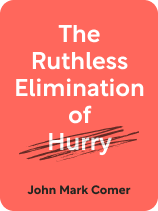

This article is an excerpt from the Shortform book guide to "The Ruthless Elimination of Hurry" by John Mark Comer. Shortform has the world's best summaries and analyses of books you should be reading.
Like this article? Sign up for a free trial here.
Are you busy in a way that’s fulfilling or in a way that just feels hectic? Do you prioritize your well-being as much as you should?
In The Ruthless Elimination of Hurry, pastor and author John Mark Comer makes a distinction between busyness that’s beneficial and busyness that’s detrimental. He warns against the type of busy lifestyle that leads to weak relationships, disconnection from God, poor health, and a lack of purpose.
Read on to learn about the dangers of a busy lifestyle that tends to run you ragged.
Positive vs. Negative Busyness
According to Comer, busyness can be either negative or positive. He draws a distinction between two types of busy lifestyles—what we’ll call lively (positive busyness) and rushed (negative busyness):
- When your life is lively, it brims with meaningful experiences. Comer presents four criteria that characterize meaningful experiences: They 1) nurture your spirituality, 2) deepen your relationships, 3) support your health, and 4) cultivate your sense of purpose.
- When your life is rushed, it’s packed with meaningless experiences—time-consuming tasks that distract you from meaningful experiences.
(Shortform note: Busyness may have additional benefits beyond those Comer explores: Specifically, busyness may improve cognition and increase self-control. One study found that busy people tend to score higher on cognitive tasks, such as tasks related to memory, compared to people who are less busy. Another study found that reminding people about their busy lifestyle increases the likelihood that they’ll make decisions that benefit them in the long run, such as decisions related to exercise and saving for retirement. This suggests that busy people tend to delay gratification in favor of making healthy choices.)
Shortform Example: A Rushed Day vs. a Lively Day
To further illustrate the difference between a rushed lifestyle and a lively one, let’s compare a rushed weekday with a lively weekday.
If you’re rushing, you may begin your day by playing a fast-paced game on your phone before breakfast. At work, you spend your half-hour lunch break eating while catching up on emails. After returning home from work, you quickly heat up dinner for your family and eat together while watching TV. Then, right before bed, you respond to more emails.
By contrast, if your day is lively, you may start your day nurturing your spirituality by praying before breakfast. Then, at work, you support your health by taking a break from work during your half-hour lunch. After returning home, you cook dinner with your family and further deepen your relationships by talking with them throughout dinner. Finally, before bed, you cultivate your sense of purpose by spending time songwriting.
The 4 Perils of Rushing
Comer argues that, over time, rushing has the opposite effect of meaningful experiences: Rushing degrades your relationships, spirituality, health, and sense of purpose. Let’s explore each of these perils.
Peril 1: Weak Relationships
According to Comer, it’s impossible to maintain strong, loving relationships when you live a rushed lifestyle. Here, we’ll highlight two ways that rushing harms your relationships.
First, rushing makes you stressed, and this stress makes you less patient and gentle around your loved ones. Over time, this behavior strains your relationships. For example, imagine your partner tries to strike up a conversation while you’re rushing to leave for work and you snap at them for interrupting you. To avoid being snapped at again, they strike up fewer conversations with you. As a result, over time, the two of you talk less and thus grow distant.
(Shortform note: Some psychological research supports Comer’s claim that stress harms your relationships and provides additional reasons for this effect. First, a stressful, rushed lifestyle leaves you less time for leisure activities, which are important times to bond with loved ones. Additionally, stress makes you anxious and hypervigilant, leading you to see problems in your relationship that aren’t actually there. For instance, after noticing your partner likes to spend their evenings engrossed in playing video games, you might jump to the false conclusion that they don’t want to spend time with you.)
Second, when you’re rushing, you’re preoccupied with being efficient and productive, which leaves you less emotionally available to others. For example, during dinner, you may be so busy making a mental to-do list for tomorrow that you fail to notice that one of your family members is uncharacteristically quiet. Therefore, you miss the opportunity to ask them if they’re OK and offer emotional support.
(Shortform note: A rushed lifestyle might cause another problem that can weaken your relationships: a lack of emotional vulnerability, or the ability to share your feelings with others. When you’re rushing, you’re less likely to take time to open up about your feelings to others. This leaves your loved ones guessing about how you’re feeling and how they can best support your needs and desires, which in turn could breed tension and dissatisfaction. Additionally, your lack of vulnerability could weaken your bond with others—they may feel less close to you when they’re unaware of how you’re feeling.)
Peril 2: Disconnection From God
According to Comer, rushing also harms another relationship: your connection with God. Meaningless activities snatch your attention away from spiritual practice. Your prayers start getting shorter, you begin skipping church, and your nightstand Bible starts to collect dust.
(Shortform note: Feeling disconnected from God due to a rushed lifestyle may lead to an additional negative consequence: less resilience. Some studies reveal that spiritual people often benefit from spiritual coping—that is, their connection to God helps them deal with adversity. These people report that God’s presence in their lives provides them with the strength to endure challenges, including physical illness.)
Peril 3: Poor Health
Comer says that in addition to weakening your relationships, rushing degrades your mental and physical health.
Mental health: As previously noted, a rushed lifestyle is stressful. If unaddressed, this stress can harm your long-term mental health. For example, imagine your child is having a tough time in school. You love them deeply, but you feel too busy to provide them with the close support they need. Every time you think about your child, feelings of worry and guilt arise. You believe that you’ve failed as a parent, which lowers your self-esteem. If you fail to manage your worries and recover your self-esteem, you may start experiencing symptoms of anxiety or depression.
Physical health: According to Comer, a rushed lifestyle also harms your physical health. When you’re rushing, you make less time for quality sleep, exercise, and healthy eating. Failing to meet these basic needs also increases your chances of getting sick.
(Shortform note: Mental health and physical health are closely linked. Research shows that chronic psychological stress, such as that caused by rushing, can also be bad for your heart. While Comer’s solutions are largely spiritual, health experts tend to recommend other stress management strategies, such as exercise, rest, and “scheduling the worry”: assigning stressful tasks to predetermined periods in the day.)
Peril 4: A Lack of Purpose
Finally, Comer says that when you’re rushing, you lose your sense of purpose in life. Meaningful experiences give your life purpose, but you can’t fully engage in such experiences if you’re preoccupied with meaningless tasks. For example, perhaps it’s one of your long-term goals to publish a science fiction trilogy. However, your rushed lifestyle leaves you exhausted in the evening and on weekends, so you engage in meaningless distractions instead of writing.
(Shortform note: Even if you don’t live a rushed lifestyle, finding your purpose can be challenging. In Ikigai, Héctor García and Francesc Miralles provide guidance on finding your life purpose by exploring the Japanese concept of ikigai. According to ikigai, your life purpose falls at the intersection of what you love, what the world needs, what you’re good at, and what you can be paid for.)

———End of Preview———
Like what you just read? Read the rest of the world's best book summary and analysis of John Mark Comer's "The Ruthless Elimination of Hurry" at Shortform.
Here's what you'll find in our full The Ruthless Elimination of Hurry summary:
- Our cultural obsession with rushing and how it's harmful in many ways
- How to stop rushing by deepening your Christian spiritual practice
- How to carve out more time for your spiritual practice






